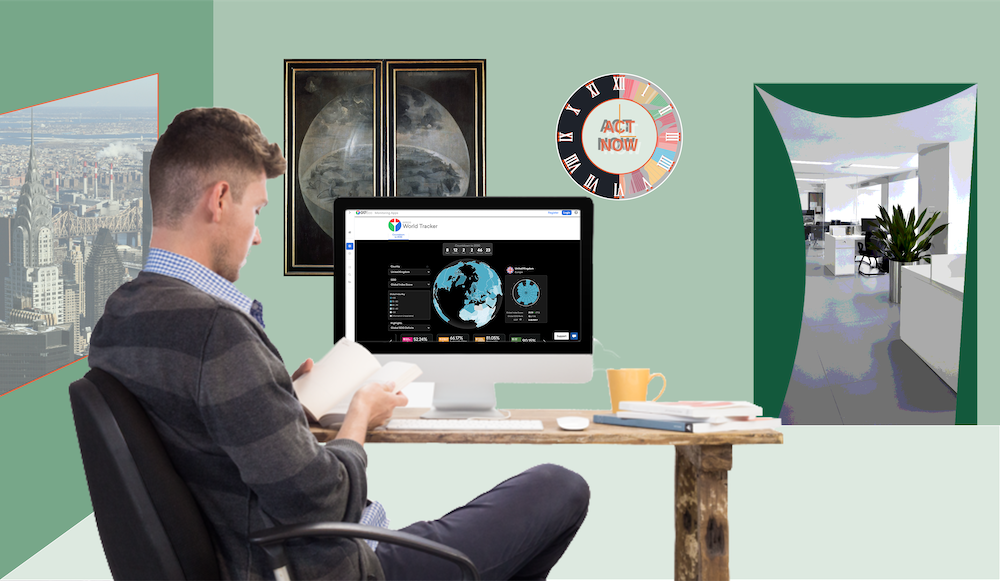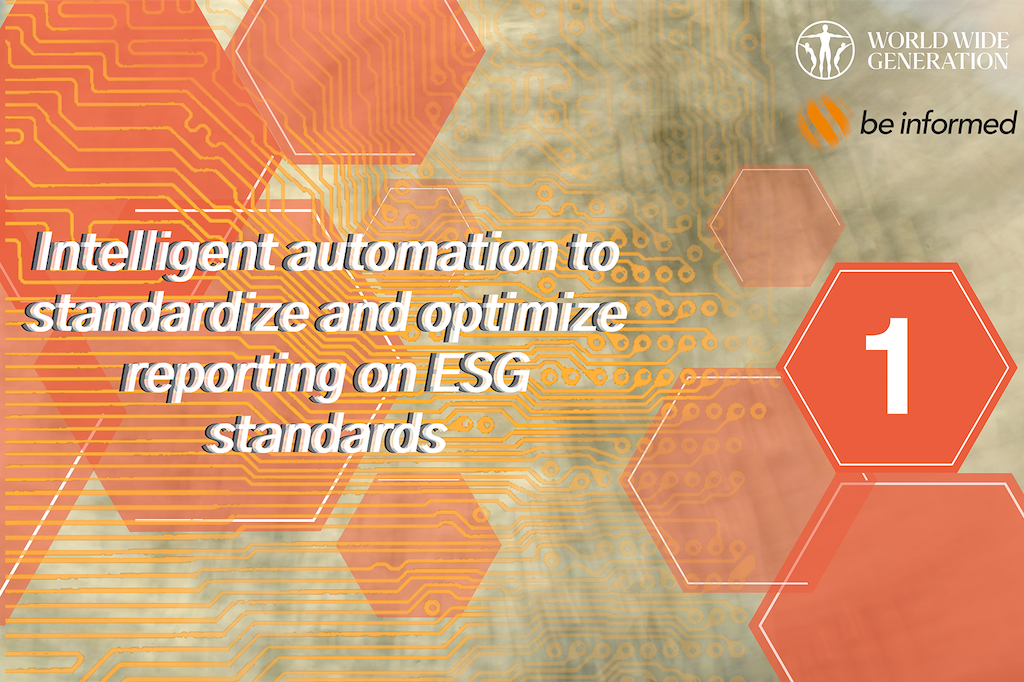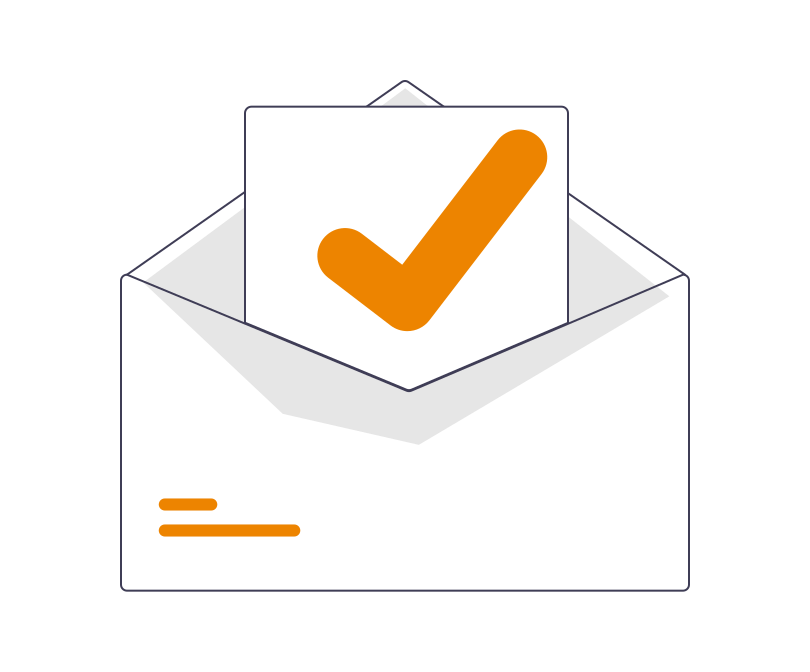Welcome to the first blog in this collaborative series with World Wide Generation, where we look to explore the possibilities that automation and AI can offer sustainability reporting as the world collectively embarks on a global sustainable transformation.
The need for clear ESG standards
The disruption caused by COVID has drastically increased the sector’s growth as investors search for companies with business models that are sustainable and capable of withstanding market shocks. This magnified interest has led to a record amount of investment into ESG funds this year and also highlighted the need for clear ESG standards in order to allow companies to report their sustainability-related data appropriately for their stakeholders [1]. The EU’s Sustainable Finance Regulations, including the EU Taxonomy, should go a long way to enable stakeholders to trust ESG funds and that their constituents align with stakeholder values. There have also been positive developments between the main standards setting organisations (GRI, CDP, SASB, IIRC and CDSB) to collaborate and standardise metrics and reporting practices which can only have a positive knock-on effect on ESG investing.
Importance of reporting sustainable data
Interest from the general public and investors in ESG is at an all-time high due to the combined factors of COVID and the climate crisis. Although momentum is building and progress has been made, now is the time more than ever to realize the importance of companies reporting standardized, granular, and validated data. In doing so, companies can firstly identify any internal risks and also provide the material information needed by investors to incorporate sustainability-related issues into their investment decisions. Although current sustainability reporting practices are improving, there is significant work to do to provide stakeholders with the correct information and move away from the old system of filling in countless surveys and third-party data scraping to the new frontier of real-time, standardized, and granular reporting. Understanding and reporting against the UN Sustainable Development Goals (SDGs) can help companies fully quantify their sustainability impact.
What are the SDGs?
The SDGs or Global Goals are a collection of 17 interlinked goals designed as a “blueprint to achieve a better and more sustainable future for all”[2]. The SDGs were set up in 2015 by the United Nations General Assembly and are intended to be achieved by the year 2030. They are included in a UN Resolution called the 2030 Agenda or what is colloquially known as Agenda 2030 [3]. Environmental Social and Governance (ESG) is heavily embedded within the SDGs and through understanding the significance of the SDGs, ESG mandates and strategies can be achieved.
Standardized reporting of SDGs
To report SDGs in a standardized way, is to provide evidence and verification and to gain the trust of investors as data comes directly from the source. This is one of the distinct and futuristic strengths of the Word Wide Generation (WWG) platform. WWG is a sustainability fintech aiming to facilitate the delivery of the SDGs by providing stakeholders with the data they need to invest and drive the needle on sustainable development. There are various other functions built into the WWG platform such as delegation of SDG questions down the supply chain and building an assurance portfolio which only further adds to the level of transparency and accountability of the data.
The concept of materiality has been built into the platform resulting in companies being presented with the ability to identify material SDGs and therefore focus on how their business positively or negatively impacts them. Material reporting of sustainability data is vital as it means investors and other stakeholders have access to business-relevant information. Through the two WWG apps, Company Tracker and Portfolio Tracker, companies can report their sustainability data against a variety of existing standards, such as CDP, SASB and GRI, which then gets mapped against the SDGs to provide the company with an indication of their SDG contribution. Investors can then use Portfolio Tracker to identify which companies within their portfolio are contributing to the SDGs and identify how their portfolio is contributing towards the SDGs.
Fast track the process with automation

The tasks set out in reporting standards, such as the SDGs or the UNPRI reporting framework that comes into play December 2021, will be no small challenge to achieve. Intelligent automation is of great importance to improve on ESG reporting and get more out of sustainability platforms such as WWG. Intelligent automation has the potential to streamline the onboarding process of companies in two ways. First, automation can help map information sources, and create the reporting structure. With the help of automation, the company should be able to define its structure via an interface which will create all the relevant infrastructure behind the scenes, ready for the reporting company to use. This will make data retrieval easier at a later point in time, in order to discover, report, and monitor activities.
Second, WWG’s platform and the onboarding of companies are based upon sector-specific materiality of SDGs. The different SDGs will all have varying degrees of materiality to diverse sectors which are defined as part of the onboarding process. The sector and materiality, therefore, dictate the universe of questions a company should be answering. When a company is creating their report they will select these highly material questions that have been automatically marked by the platform. In WWG’s case, automation is suitably poised to fast track the question selection process by preloading high materiality questions relevant to the company being onboarded, bypassing a time-staking manual task and allowing more time to commit to what the platform is intended for: aggregating sustainability data.

Free up time and manpower with intelligent automation
Companies and indeed, governments at present have a large number of regulations and reporting to comply with. To some degree and subject to the market sector, compliance has been seen as a tax on the business and a financial burden. More so than ever, it is vital to turn up the dial on hyper-automation. The great thing about automation is that it’s not sector-specific. Intelligent automation could help improve processes or situations of any organisation dealing with mass client onboarding or handling multiple account set-ups. Automation can remove repetitive tasks and free up time for human workers.
A solution to consolidate and orchestrate existing systems, data and reporting is the ‘Be informed’ intelligent automation platform. This platform uses model-based intelligent automation to rapidly capture and automate processes, without additional programming or conversion into code. It was designed to deliver complex automation across multiple systems and data sources utilising its dynamic case management. Be Informed is an internationally operating digital transformation agency, focused on the intelligent automation of knowledge work.
Capturing the essential corporate knowledge to adhere to compliance to make complicity in these ever-expanding and complex regulations ease your business’s burden, and it can be done at scale with Be Informed. As a result, organizations are left with more time and human resources to devote to building relationships and serving clients.
Future telling of automation and sustainability
The case and argument for both reporting against non-financial issues and employing the use of automation in your business model are paramount in the course of the coming years. The decade of action has begun, as we move into 2021 it is only predictable that the front runners of this new age will report sustainability-related data transparently and maximise the efficiency of their business through mass automation, eradicating all unnecessary time consuming and laborious work tasks.
To be ahead of the curve, it would be intuitive of you and your business to commence implementing such practices into your model of operating. However, this is a big, bold and widely undocumented new world that you are choosing to enter into. So why not let us, Be Informed and World Wide Generation guide you into the realms of tomorrow. Register here to start your journey to an automated business and for the ultimate sustainable reporting tool and guidance register here. Stay tuned for our next collaborative issue as we continue to explore and delve deep into the realistic and theoretical possibilities of the next era of digital development.






